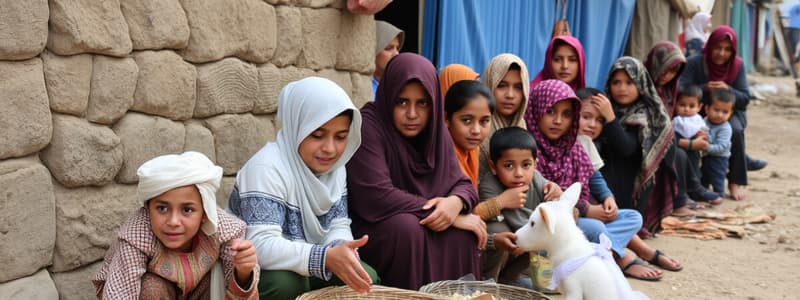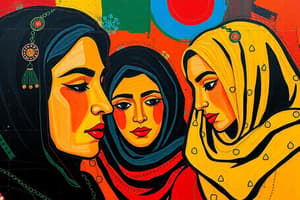Podcast
Questions and Answers
What has contributed to the significant Afghan refugee population in Pakistan?
What has contributed to the significant Afghan refugee population in Pakistan?
- Economic opportunities in Pakistan
- Educational programs in Pakistan
- Natural disasters in Pakistan
- Conflict and instability in Afghanistan (correct)
Afghans in Pakistan universally experience social acceptance within local communities.
Afghans in Pakistan universally experience social acceptance within local communities.
False (B)
Name two common sectors of employment for Afghan refugees in Pakistan.
Name two common sectors of employment for Afghan refugees in Pakistan.
Construction and trade
Afghans in Pakistan rely on humanitarian aid, which affects their economic __________.
Afghans in Pakistan rely on humanitarian aid, which affects their economic __________.
Match the following challenges faced by Afghan refugees with their descriptions:
Match the following challenges faced by Afghan refugees with their descriptions:
Which of the following is a challenge that Afghan youths face in Pakistan?
Which of the following is a challenge that Afghan youths face in Pakistan?
Study Notes
Sociocultural Assimilation of Afghans in Pakistan
Refugee Integration
- Significant Afghan refugee population in Pakistan, primarily due to conflict and instability in Afghanistan.
- Integration varies by region; urban areas often offer better opportunities than rural settings.
- Educational programs aimed at Afghan children have been implemented, though access remains inconsistent.
- Legal status of Afghans fluctuates, affecting their ability to integrate fully into society.
- Social acceptance is mixed; some communities are welcoming, while others exhibit resistance.
Economic Impact
- Afghans contribute to the local economy through entrepreneurship and labor.
- Common sectors of employment include construction, trade, and agriculture.
- Economic contributions, however, are often unrecognized; Afghans may face discrimination in job markets.
- Dependence on humanitarian aid continues to be a challenge, impacting economic self-sufficiency.
- Informal economies thrive, with Afghan businesses playing a vital role in local markets.
Social Challenges
- Cultural differences can lead to tensions between Afghan refugees and local communities.
- Issues of identity, belonging, and cultural preservation are prevalent among Afghan youth.
- Afghans face barriers to healthcare and social services, exacerbated by lack of legal documentation.
- Instances of xenophobia and social exclusion have been documented, impacting mental health.
- Community organizations and NGOs work to promote integration and address grievances, although resources are limited.
Refugee Integration
- A large population of Afghan refugees resides in Pakistan due to ongoing conflict and instability in Afghanistan.
- Integration levels differ by geographic location; urban areas typically provide more opportunities than rural regions.
- Educational initiatives for Afghan children exist but access remains inconsistent across different areas.
- Legal status of Afghan refugees varies, impacting their ability to fully participate in society.
- Social acceptance varies, with some communities demonstrating hospitality while others show resistance to integration.
Economic Impact
- Afghan refugees significantly contribute to the local economy through entrepreneurship and various labor sectors.
- Commonly employed in construction, trade, and agriculture, Afghan refugees play a vital role in these industries.
- Economic contributions from Afghan refugees are often overlooked, and they frequently encounter discrimination in job markets.
- Dependence on humanitarian aid hampers their ability to achieve economic self-sufficiency.
- Many Afghan businesses thrive in informal economies, enhancing local market dynamics.
Social Challenges
- Cultural differences can lead to tensions between Afghan refugees and the local population.
- Afghan youth often struggle with issues related to identity, belonging, and the preservation of their culture.
- Barriers to accessing healthcare and social services are prevalent, particularly due to the lack of legal documentation.
- Instances of xenophobia and social exclusion have been reported, negatively affecting mental well-being.
- Community organizations and NGOs are active in promoting integration efforts and addressing social grievances, though they are often limited by available resources.
Studying That Suits You
Use AI to generate personalized quizzes and flashcards to suit your learning preferences.
Description
Explore the complex integration of Afghan refugees in Pakistan, highlighting the challenges and contributions they face in society. This quiz covers various aspects such as education, legal status, and economic impact, providing insights into both the opportunities and difficulties in their assimilation. Understand the mixed social acceptance and the role of Afghans in the local economy.




